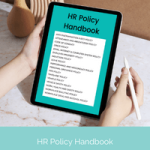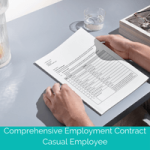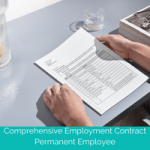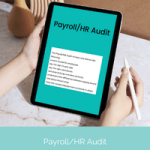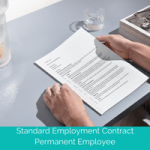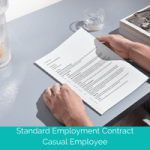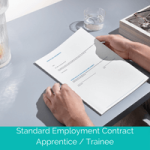Annual Leave
Annual leave is also known as holiday pay, employees are paid while having time off from work when they are on annual leave.
Annual leave is an entitlement under the National Employment Standards (NES).
As an employer, you can’t offer less that the NES entitlement. Awards refer to these entitlements. But, you can choose to give employees more than 4 weeks annual leave per year if you want to.
Who is entitled to annual leave & how much do they get?
Permanent employees are entitled to paid annual leave.
(Casual employees don’t get annual leave, they receive a 25% loading to compensate them for annual leave and other entitlements that permanent employees receive)
Full-time & part-time employees get 4 weeks of annual leave, based on their ordinary hours of work.
Example: annual leave for a part-time employee:
Michelle works 20 hours per week.
During that year, she will accumulate 80 hours of annual leave (the equivalent of 4 weeks x 20 hours).
Annual leave is taken on the days she would normally work.
Shift workers may get up to 5 weeks of annual leave per year depending on their Award or agreement, so if you have shift workers you should check your Award to make sure your employees are accruing annual leave correctly.
How does annual leave accumulate?
Annual leave accumulates from the first day of employment, even in a probation period. The leave accumulates during the year & employees don’t lose or forfeit any unused annual leave if they don’t take it in the year it accrues.
It is paid at the pay rate when the leave is taken, not when it accrues. So, for example, if an employee accrues leave as an apprentice, but takes the leave when they are a tradesperson, they get it paid at the tradesperson rate. A similar situation would be if an employee is promoted or gets a pay increase, it’s paid at the rate the employee is on at the time they take the leave.
Annual leave accrues when an employee is on paid leave such as paid annual leave & paid personal/carer’s leave, paid community service leave such as jury duty or long service leave.
Annual leave usually doesn’t accrue when the employee is on unpaid leave such as unpaid personal/carer’s leave, unpaid parental leave (even if the employee is on the Government Paid Parental Leave scheme), leave without pay or unpaid family and domestic leave.
Requesting annual leave
An employee should make a request to take annual leave before going on leave. It’s a good idea to have this process set out in a Leave Policy so your employees know when and how to apply for annual leave.
A business can set the amount of notice they require when an employee applies for leave. Some businesses may need 4 weeks notice so they have time to make arrangements to cover the absence, other businesses may require less time.
An employer can refuse an employee’s request for annual leave, but the refusal must be reasonable. For example, there may be certain times of the year where leave is not allowed to be taken or if other staff members already have leave approved for the same period and the business can’t accommodate multiple employees being on leave at the same time.
How much annual leave can be taken at one time?
There’s no rule about the minimum or maximum amount of annual leave that can be taken at a time. As long as it suits the business and it’s approved, an employee can take a part day, a single day or several days or weeks off. Guidance on any restrictions or limits should be in a leave policy.
Employees don’t need to take all of their annual leave at once.
Unpaid Leave
Once an employee has used all of their paid annual leave, they may apply for unpaid leave but there is no entitlement to Leave Without Pay in the Fair Work Act so it’s up to an employer to decide whether Leave Without Pay is approved.
Tracking Annual Leave
There’s no obligation or requirement for an employer to provide annual leave balances on an employee’s payslip, but the Fair Work Ombudsman’s website states that:
“While it is best practice to show employee’s leave balances on their pay slip, it’s not a requirement. Employees do need to be told their leave balances if they ask for it.”
Directing an employee to take annual leave
An employer can direct an employee to take annual leave when the business is closed during the Christmas/New Year period, or if an employee has an excessive annual leave balance. To avoid an employee ending up with an excessive annual leave balance, you should encourage employees to take leave regularly.
The rules about when and if an employer can direct an employee to take annual leave is set out in Awards & agreements. For example, an Award or agreement will state how much notice an employer needs to give their employees for a Christmas/New Year period shut down.
Cashing out annual leave
Cashing out annual leave means an employee receives payment for their annual leave instead of actually taking the time off work.
Most Awards and agreements allow Annual leave to be cashed out and certain rules apply when cashing out annual leave in accordance with the Fair Work Act:
· an employee needs to have at least 4 weeks annual leave leftover
· a written agreement needs to be made each time annual leave is cashed out
· an employer can’t force or pressure an employee to cash out annual leave
· the payment for cashed out annual leave must be the same as what the employee would have been paid if they took the leave.
Check your Award to make sure you understand what is allowed.
We can help you stop wasting time and money by providing expert on-demand HR services for an affordable monthly fee.
For further expert advice on human resources or if you have any questions about anything HR related, get in touch.
Karen Hillen is your HR Partner, she helps businesses by providing HR support and advice services.
For the right HR support and advice, book a My HR Partner HR Advice call with Karen Hillen.
https://booking.myhrpartner.com.au/15minute-hr-advice-call
https://booking.myhrpartner.com.au/30minute-hr-advice-call
My HR Partner memberships provide 24/7 access to employment contracts, HR policies and documents, and HR advice calls. These services are tailored to the member’s needs and can be accessed on demand through phone or email for performance management issues, pay rates and Award advice.
Find out more about My HR Partner HR Hub membership here:

